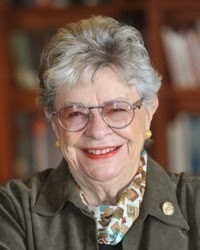 |
| Sondra Hale |
Professor Emerita of Anthropology and Gender Studies, as well as former Co-Chair of Islamic Studies at UCLA, and past Co-Founder and Co-editor of The Journal of Middle East Women’s Studies, Dr. Sondra Hale’s dynamic career has always been spirited with a deep sense of activism. Dr. Hale, an alumna of UCLA, received her B.A. in English Literature, M.A. in African Studies, and Ph.D. in Anthropology, and has taught at the University of Khartoum (Sudan), California Institute of the Arts, and at California State Universities at Long Beach and Northridge.
In her Oral history exchange with WSMALA, Hale attributes much of her early social justice zeal, particularly in matters of racial politics and gender equality, to her mother, Norma Badger. Married at the mere age of 16, Hale explains, her mother was a pioneer against prejudice within her bigoted surroundings. She cultivated an early and deep sense of activism within Sondra and pushed her far beyond the rigid walls of American society, late 1930s onwards. She recalls, “For a white woman living in Des Moines, Iowa, she had very, very clear progressive race politics, although her parents were bigots.” Her mother, valued economic independence and thus, worked to achieve a white-collar job as a radio station Traffic Manager, a rarity for her time. Hale credits her enamor with education to her mother, who had convinced Sondra that going to school would someday become her career.
During her time at UCLA, Sondra met and eventually married UCLA Geographer, Gerry Hale. Together, they ventured to Sudan, where she has since dedicated over 50 years of her life to research and personal pursuits. The couple’s interest in East Africa inspired their two Eritrean daughters’ adoption. “Negotiating the terrain of [her] transracial family,” Hale explains, has necessitated considerable time and energy. The Hale family is thus, indicative of the activism, which Sondra demonstrates in her professional life. “Sondra’s life has had four components running simultaneously [throughout]: activism and service to the community; academic teaching, research and writing; activism and creative writing and curatorial projects in the arts; and family life.”
Author of Gender Politics in Sudan: Islamism, Socialism, and the State (1996, translated into Arabic in 2011), amongst many other notable works, Hale’s issues of interests include: “gendered war, conflict, and genocide; social movements; international gender studies; gender and citizenship; diaspora studies; cultural studies, and boycotts and academic freedom.” Her regional interests include Africa and the Middle East, focusing mainly on Sudan and Eritrea. Dr. Hale’s passion for writing also shines through in topics surrounding feminist art. Her book, From Site to Vision: The Los Angeles Woman’s Building in Contemporary Culture (2011), was written in conjunction with ‘Doin' It in Public: Feminism and Art at the Woman's Building.’ Together, the work “comprises an exhibition, two scholarly publications, and series of public events that document, contextualize and pay tribute to the groundbreaking work of feminist artists and art cooperatives that were centered in and around the Los Angeles Woman's Building (downtown L.A.) in the 1970s and 1980s.”
Describing herself as an “activist academic” Professor Hale co-founded Feminists in Support of Palestinian Women, the Darfur Task Force, California Scholars for Academic Freedom, and the U.S. Committee for the Academic and Cultural Boycott of Israel. Her robust sense of activism also takes form in various anti-war/anti-occupation activities (Iraq, Palestine, Lebanon), and civil rights/human rights issues.
In addition to various teaching awards Dr. Hale was awarded the Fair and Open Academic Environment Award from UCLA (popularly known as the “diversity award”) and has received numerous awards from National Science Foundation, American Association of University Women, National Endowment for the Humanities, Fulbright, and several others for her philanthropic endeavors. In 2011, Sondra Hale was awarded the Life-Time Scholarly Achievement Award from the Association for Middle East Women’s Studies, and an award “In Recognition and Appreciation of Her 50 Years of Commitment and Valuable Contributions in Support of the Sudanese Women’s Movement” from Salmmah Women’s Resource Center in Khartoum, Sudan.
Dr. Sondra Hale will be a panelist at the Celebrating Los Angeles' Women's Social Movements on February 24, 2014 at UCLA.
--Radhika Mehlotra
Radhika Mehlotra is a first-year MPP student at the UCLA Luskin School of Public Affairs and a Graduate Student Researcher at the UCLA CSW
Sources:
1. http://oralhistory.library.ucla.edu/viewFile.do?itemId=2852896&fileSeq=3&xsl=http://oralhistory.library.ucla.edu/xslt/local/tei/xml/tei/stylesheet/xhtml2/tei.xsl
2. http://oralhistory.library.ucla.edu/viewFile.do?itemId=2852896&fileSeq=1&xsl=http://oralhistory.library.ucla.edu/xslt/local/text.xsl
3. http://www.womansbuilding.org/fromsitetovision/

